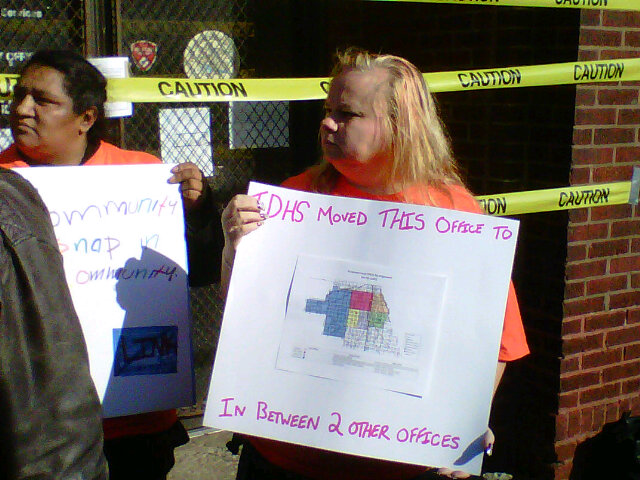

Outreach coordinator and Back of the Yards resident Michelle Torres protests the closure of the DHS facility at 610 W. Root St. (Photo: Jeff Kelly Lowenstein)
On a crisp Halloween morning, 55-year-old Salvador Cervantes approached the red brick Illinois Department of Human Services building that stretches for most of the 600 block on West Root Street.
But instead of entering the building to access the services he sought, three long strips of yellow tape with black words "Caution" stretched across the front door's entrance greeted him.
Closed.
Lean, with a weathered face and a tired voice, the Michoacan native, who does not work due to a disability, was just one of a steady stream of people who approached the facility, unaware that it had been shuttered the previous Friday.
Department of Human Services spokeswoman Januari Smith said the Root Street office Cervantes and others approached was dilapidated and crumbling inside. Having customers go to a new office at 59th and Ashland Ave., about 3.5 miles away in the West Englewood neighborhood, will allow the department to deliver its services "in a facility that is handicapped accessible and safe for staff alike," she said.
There is little doubt that the services are needed, according to a report released October 31 by the Illinois Hunger Coalition.
Latinos Organized for Justice, an arm of the coalition, conducted a survey in the spring of 2010 of 206 Back of the Yards residents, 76 percent of whom were Latino. A key finding: despite have an adult working full-time in the household, 51 percent of participants reported sometimes, rarely or never having enough to eat.
"Having a job doesn't guarantee that rent will paid, that electricity will be turned on, or even that children will be fed," the report's executive summary said.
In spite of this need, though, some residents like community leader Cira Isidoro, who wore an orange Illinois Hunger Coalition t-shirt, said she will not go to the new office.
"It's in front of a liquor store," Isidoro said. "There are many gangs there. I'm not going to go there."
Michelle Torres, an outreach coordinator for the Illinois Hunger Coalition, said many residents share Isidoro's concern about safety issues. Torres said she canvassed the neighborhood and got more than 500 signatures of residents opposed to the closure, which impacted more than 20,000 people, according to the coalition.
Arrests data from the Chicago Police Department appear to support residents' concern.
Whereas the 600 block of West Root had just four drug-related arrests from 2001 to 2011, according to an Hoy analysis of police data, the block at 5900 South Ashland had 72 such arrests in the same time period.
And the 6300 block of South Cottage Grove Ave., site of another DHS facility near the Root Street address, had 138 drug-related arrests during those same years, Hoy's analysis found.
Smith of the department said customers are able to use the telephone and internet for self-service if they do not want to travel to other destinations, but Katie Klus, media contact for the Illinois Hunger Coalition, said she had placed about 10 calls to the office without being able to reach anyone.
The people gathered at the site said they hope to get the city to reopen the building, but Illinois Hunger Coalition Executive Director Diane Doherty sounded a realistic note.
"We know it's sort of a done deal," she said.
What should public agencies do during this time of extended economic downturn? What should the residents do? Do you know people who work full-time and are hungry?